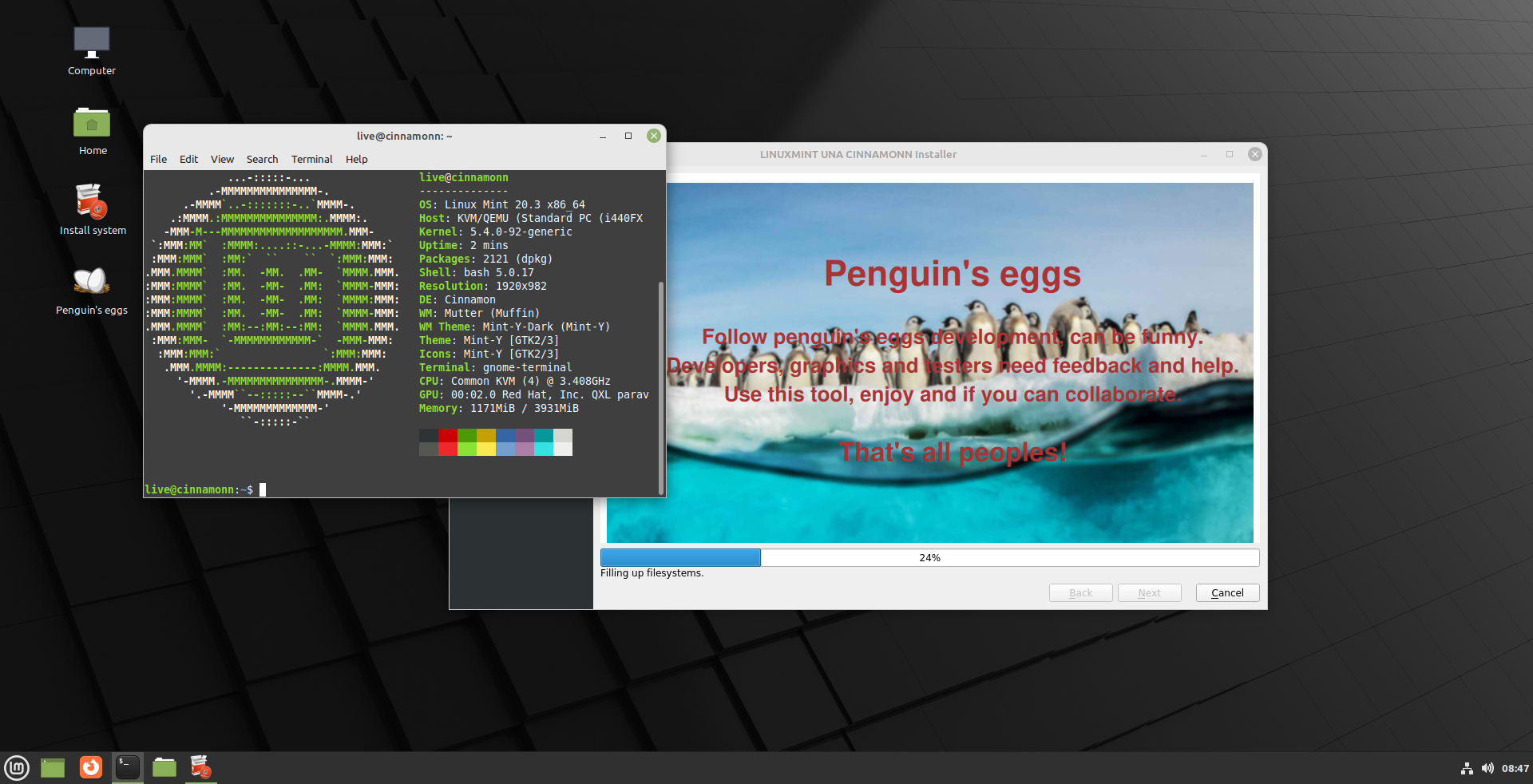Costumes and wardrobes
This is a costume, a simple way to code our customizations starting from a naked system to a minimun KDE installation.
# recipe: kde
# author: artisan
---
name: kde
description: minimal KDE installation
author: artisan
release: 0.0.3
distroId: Debian
codenameId: booksworm
releaseId: sid
applyTo: naked
sequence:
repositories:
sourcesList:
main: true
contrib: true
nonFree: false
sourcesListD:
- curl -fsSL "https://pieroproietti.github.io/penguins-eggs-ppa/KEY.gpg" | gpg --dearmor -o /usr/share/keyrings/penguins-eggs-ppa.gpg
- echo "deb [signed-by=/usr/share/keyrings/penguins-eggs-ppa.gpg] https://pieroproietti.github.io/penguins-eggs-ppa ./ " | tee /etc/apt/sources.list.d/penguins-eggs-ppa.list > /dev/null
update: true
full-upgrade: true
packages:
- kde-plasma-desktop
- plasma-nm
- ark
- kate
- kcalc
- kde-spectacle
- firefox-esr
- okular
debs: false
dirs: false
hostname: true
customizations:
scripts:
- null
reboot: true
...
eggs come with a new command: wardrobe.
You can prepare your costumes to dress your penguins, costumes are simple and automatic configuration. A costume consists just on a dir named after the costume and an file index.yml, as you can note, we have large spaces for others future addictions: debs, icons, themes and so on.
Inside wardrobe.d you will find same simple examples: xfce4 and KDE costumes.

Logic for costumes is enought simple, we have a directory named after the costume and an index.yml.
In index.yml, we have:
sequence
Here we define the sequence of that we will do. Example:
#
# We start here, step by step
#
sequence:
repositories:
sourcesList:
main: true
(...)
repository
Here we define that will do with repositories, usually four tasks, the first sourcesList it's to check that component must be present in /etc/apt/sources.list: main, contrib, non-free. The second sourcesListD, commands to adds other repositories to ```/etc/source.list.d'''. The third task is mandatory update, the forth can be optional full-upgrade. Example:
#
# steps for repositories
#
repositories:
- sourcesList
- sourcesListD
- update
- full-upgrade
In the upper example I excluded step sourceListD, becouse actually I have same problems with my pubblic key.
sourcesList
Here we define, that components we need. Example:
#
# components to be added to /etc/apt/sources.list
#
sourcesList:
main: true
contrib: true
nonFree: false
sourcesListD
Here we define commands to add other repositories to /etc/apt/sources.list.d
example:
#
# add entries on /etc/apt/sources.list.d
#
sourcesListD:
- curl -fsSL "https://pieroproietti.github.io/penguins-eggs-ppa/KEY.gpg" | gpg --dearmor -o /usr/share/keyrings/penguins-eggs-ppa.gpg
- echo "deb [signed-by=/usr/share/keyrings/penguins-eggs-ppa.gpg] https://pieroproietti.github.io/penguins-eggs-ppa ./ " | tee /etc/apt/sources.list.d/penguins-eggs-ppa.list > /dev/null
packages
As the name, here we define packages we need will be installed:
#
# packages to be installed
#
packages:
- kde-plasma-desktop
- plasma-nm
debs
We define here a place, inside our recipe, containg all the custom debs we need. In this case the directory is named debs. You can choose others name, but I think can be better to name it in accord to the scope.
#
# local dir with deb files to be installed
#
debs: false
accessories
We define others packages we want to let to the user to install or not. Like accessories to our costume.
#
# accessories for your dress
#
accessiories:
- ark
- kate
- kcalc
- kde-spectacle
- firefox-esr
- okular
hostname: true
reboot: true
your wardrobe
It's possible to create your own local wardrobe, and create personal costumes. In your costumes on your local wardrobe, you can add a place for debs, for your custom special debs you need.
Considerations

Costumes are not limited to the interfaces: Desktop Enviroment and so on. It's possible to create a dress on a system to be server for xampp or others configurations. Again, you can make an xfce4 installation specialized for eggs developer and name it hen, You will add: xfce4, nodejs-16.x, git and code. Of course, you can dress your image with the specific firmware too, and so on.
This let me to create, simple and light naked system, and the entire work of customization can go on the side of passionate system integrators.
Suggestions are welcome

It's a new feathure, so - as usual - you can find problems, lacks and so on.
Suggestions and ideas are welcome: together we can see how your ideas can fit inside.
Feel free to open an issue on github - preferred - or to email me at: piero.proietti@gmail.com
Credits
I want to thanks Jon West from waydroid, from his needs and our discussion come this idea, and pixabay.com, from where I still some fantastic free images!










